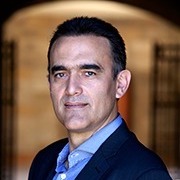Keynote Speakers
Learning Analytics Summer Institute Spain 2020 (LASI Spain 20)

Abelardo Pardo
UniSA STEM, University of South Australia
Effective adoption of Learning Analytics in Educational Institutions
June 15, 2020, 12:00-13:00
The increase in technology mediation in learning experiences is perceived both as an opportunity and as a challenge. Designs including the use of technology as more challenging to produce and the distance between design intentions and what happens during delivery widens. Learning analytics techniques may help reduce this gap by providing knowledge to guide decision making processes in this context. However, deploying these methods requires a delicate combination of expertise from various areas and a tight coordination between objectives, requirements, research and stakeholders. This talk will present a model capturing the elements and interconnections involved in institutional adoption of learning analytics and some examples of initiatives that have been trialed and their evolution.
Contact
Michail (Michalis) Giannakos
Department of Computer Science, Norwegian University of Science and Technology
Sensing-based Analytics to Support Learning Design
June 16, 2020, 12:00-13:00
Enhancing learning in a meaningful, attractive and accessible manner is critical for the 21st century. Learners need easy to use but also powerful designs, offering fine-grained control of time and progress during their learning experience. To do so, user/learner experience designers and researchers need to translate interactions into a sequence of useful and actionable information. Sensing technologies like, eye-tracking, motion cameras and wearables, combined with powerful AI and ML algorithms, have the capacity to empower teachers, learners and and researchers with (near) real-time insight. Utilizing representative, objective, diverse and accurate data allows us to better understand learners’ and design meaningful experiences for them. Collecting and combining learning analytics coming from multi-modal streams can provide valuable information in designing meaningful learning experiences. In this talk, I will present methods and studies and our initial results on how multi-modal analytics support learning design
Contact